In spite of
the decline of Covid's influence, backpackers are once again active, making
travel app development a necessity today when it is necessary more than ever.
Travel
enthusiasts need not worry about which application best meets their needs,
whether they are in search of a hotel, booking a river rafting excursion,
enjoying local cuisine, or purchasing souvenirs.
The demand
for travel is growing due to the increased digital travel sales of 10.4% in
2018 to $694.41 billion. Mobile travel is also becoming increasingly popular as
opposed to the most recent trend in online travel.
According to
an article published on Travel Agent Central, "nearly two-thirds of
travelers rely on mobile apps while traveling," and the development of
smart travel apps will have an impact on tourism worldwide.
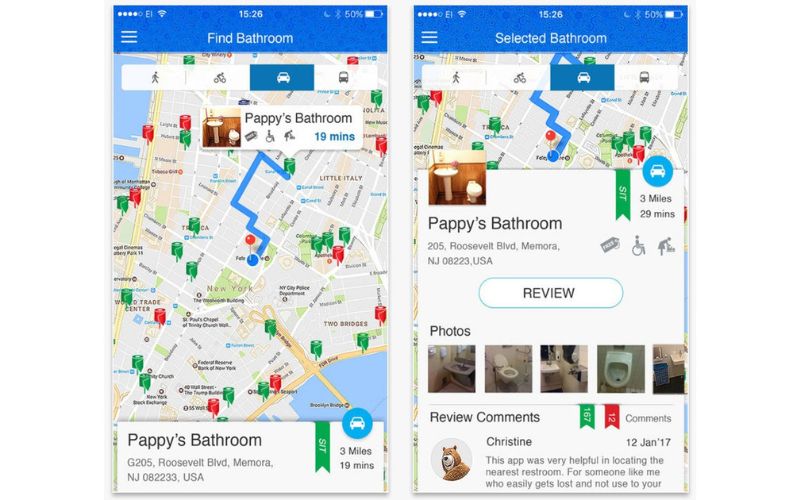
Our
presentation will provide you with an overview of the development of mobile
travel applications and what features should be considered when designing a
travel app. Before that, let’s see why we need a travel app in the first place.
Why Do We Need a Travel App?
It is
important to understand how travel apps work, whether you are looking to enter
the mobile market as a startup or as an enterprise. Below are a few statistics
that will help you make an informed decision:
⛴︎ Every month,
more than 325 million people visit the site to read hotel and restaurant
reviews and to make reservations.
⛴︎ The majority of
Americans (61 percent) have used their smartphones for the past year to book
and pay for their travel. Sixty-four percent have used their smartphones during
their travels as well.
⛴︎ It was estimated
in 2018 that the majority of bookings were made online or through mobile
applications without involving any human intervention.
⛴︎ According to
U.S. travelers, they use 7-8 apps when searching for and booking travel, with
maps at 52%, weather at 51%, and branded airlines at 50%, topping their list of
must-have applications.
⛴︎ Despite the
numerous terrible and difficult-to-use travel applications available in the
Apple and Android marketplaces, mobile apps for travel continue to have a
bright future.
Various types of mobile travel
apps
Today,
numerous applications exist that enable individuals to arrange everything from
transportation, accommodations, entertainment, and anything else they may
require while traveling.
Consequently,
all travel applications can be classified into a number of logical categories
based on their features and functionality. Let's take a close look at the
different types of mobile applications available today and the companies
involved in each.
Travel planning app
Planning is
an essential part of any trip, so this type of app can assist users when
searching for travel deals and packages, making reservations, reserving cars,
analyzing customer reviews, and tracking loyalty programs.
Trip
Planning apps can be described as pocket assistants that keep track of all your
travel arrangements.
The number
of travel app developers continues to grow quite rapidly, with many consumers
and travel agencies developing their own apps. Expedia is a popular app for
planning trips, for example.
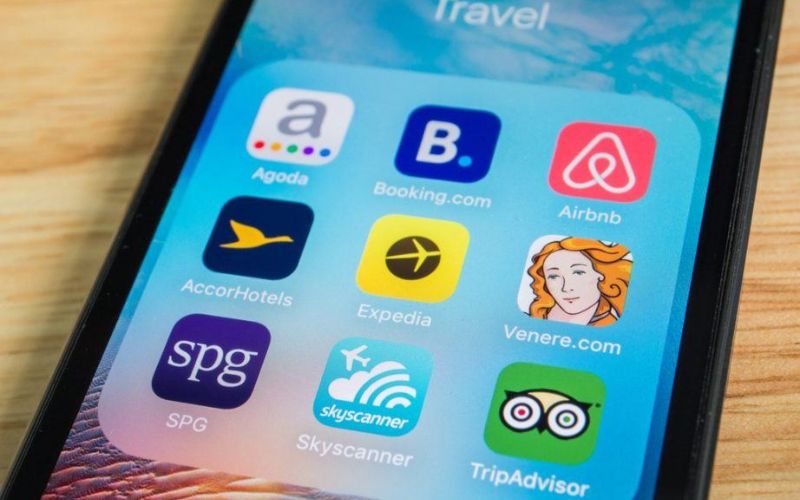
Flight booking application
It has been
noted in recent years that flight booking applications have become increasingly
popular, making the process of booking tickets easier and more efficient.
By selecting
one of these options, the user will have the ability to compare flight options,
book a flight, and finally purchase the flight.
As well
flight booking applications may include offers alerts alerting the user to the
latest deals on discounted flights as well as other tailored offers from
airlines that might be of interest to the user.
Accommodation booking app
Travelers
seeking accommodations can be contacted by hotels and property owners through
these applications.
There are
several well-known applications for booking accommodations, including Airbnb,
MrB&B Bookingcom, and Hotelscom.
Apart from
the wide selection of hotels and apartments offered by this site, you can also
find information on hotel availability and reviews around the world.
Travel guide apps
In addition
to providing travelers with information on local attractions, travel apps can
provide information on events, activities, restaurants, and city tours.
For example,
Culture Trip is one of the most popular travel apps today, providing local
knowledge and travel articles authored by local experts.
Using a
travel guide application, users are able to save itineraries, create bookmarks,
and view their complete itinerary on a map when opening the application.
How to Develop a Travel Application?
Because the
company you have found also offers software design and development services,
you have conducted some market research in order to understand the market for
your services.
Listed below
are the features you will need for your travel app to become a success and how
you can obtain them. If you have a travel app, these features are not optional.
As an
additional resource, we have compiled a list of the top features that travelers
are looking for in a travel application.
Social Media Login
It should
not take your users a lot of time to register for your app if you make the
registration process as simple as possible.
You may lose
your users if it takes them a long time to sign in via Facebook or Gmail. With
Social Login, they will be able to sign in via Facebook or Gmail more quickly,
and this will simplify the process for them.
In addition,
you will be able to build customized deals for your customers based on the
information you collect about them.
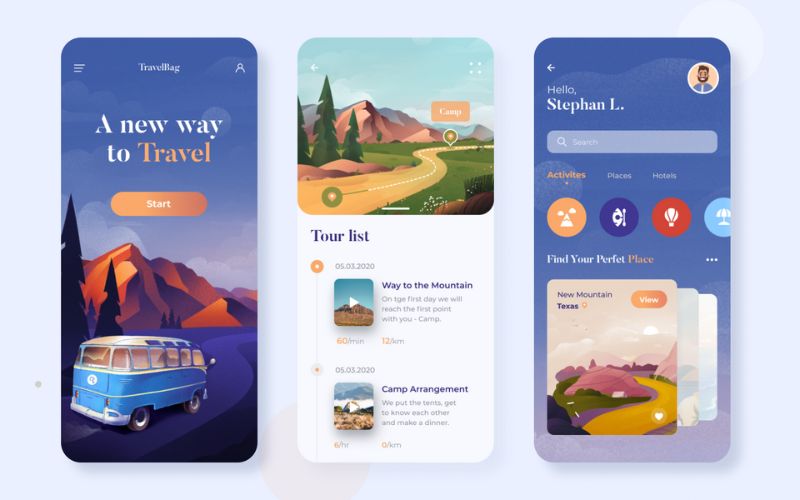
For browsing
the listings, registration should not be required, but in order to reserve a
listing, registration is necessary.
Search
All travel
apps contain a search function, regardless of whether they are used to search
for airline tickets, accommodations, or even city tours. Search functionality
should be simple and intuitive so that it can be used by anyone. It should also
be easily accessible on the screen.
You should
try to limit the number of search options you provide the user while also
providing those that are most likely to be searched for.
To view
tickets on Skyscanner, for example, a user must specify his or her destination,
determine if the trip will be a one-way trip, and specify the date of their
flight.
Booking Tickets and
Services
Once you
help them determine exactly what they wish to do during their travel days, you
can assist them with booking their flights and reserving a hotel for them their
travel days.
It is always
beneficial to send alerts when prices change based on APIs and web scraping.
APIs will enable users to see the cost of their travel based on flight costs
and train prices.
Additionally,
it would be beneficial for them to have an interface where they are able to
choose their preferred dates and filter hotels according to their preferences.
Incorporate
high-quality, detailed images of hotels into your website to provide guests
with a clear picture of their proximity to the airport, bus station, or other
local attractions.
Business and
individual customers would both benefit from the introduction of loyalty points
such as frequent flyer miles, hotel points, credit card rewards, etc. This will
improve customer retention for both parties.
Availability
of cabs and cars should also be included in your app. This is an important
component of travel that many apps overlook. Users should be able to book cabs
or cars individually or for the entire journey.
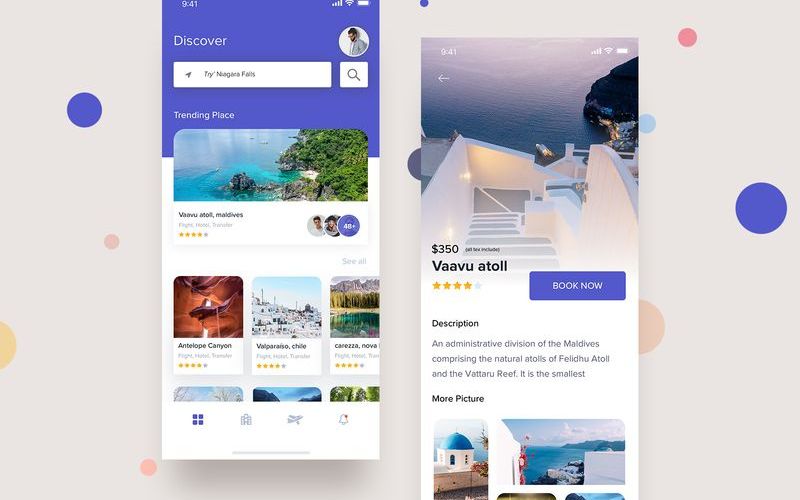
Upon
completion of the booking, the customer will be required to make a payment. It
is recommended to integrate payment gateways such as Stripe or PayPal into the
application to facilitate the payment processing process.
Navigation and geolocation
Travelers
will find it very helpful if your app has a GPS location feature, as this will
enable them to discover nearby restaurants, cafes, hotels, and museums.
In addition,
your users may be able to access the maps even if they are not connected to the
internet.
Travel Itinerary
In order for
a travel app to be effective, it must include an itinerary that contains
information on flights, schedules, car rental reservations, hotel reservations,
etc.
You should
provide users with an overview of their entire holiday through your mobile
application so that users are not required to flip through pages to locate the
information they are seeking.
Additionally,
users may add custom landmarks to their itinerary in order to simplify the
overall itinerary and make exploring it easier for them.
Listings
The
description of the item should be read in addition to getting information about
the item, regardless of whether it is a hotel room, hostel, apartment, sight-seeing
tour, or tour guide.
It would be
possible for the app to feature room listings and item descriptions, which
would provide hotel owners or managers with a detailed description of their
property, so they could provide a detailed description of their hotel. Videos,
reviews, and ratings, along with 3D tours, are among the best features of the
app.
▶️ Read More: 10 Mistakes in UX Writing That Ruin Customer Experience
Reviews
Reviews on
the internet are highly influential on consumer decisions, and consumers prefer
positive reviews to negative reviews. It is, therefore, important that your
application also collects reviews from tourist attractions, hotels,
restaurants, spas, etc.
Additionally,
to review a place, travelers should be able to leave comments and share their
experiences.
In-app payment system
Using
automated payment systems to purchase automobile tickets, tours, and other properties
can simplify the process of booking these items, and that is why users should
be able to do so after making a reservation.
Users will
be able to experience a faster and smoother booking process if the app offers a
secure payment option. This will increase their loyalty to the company through
their use of the app.
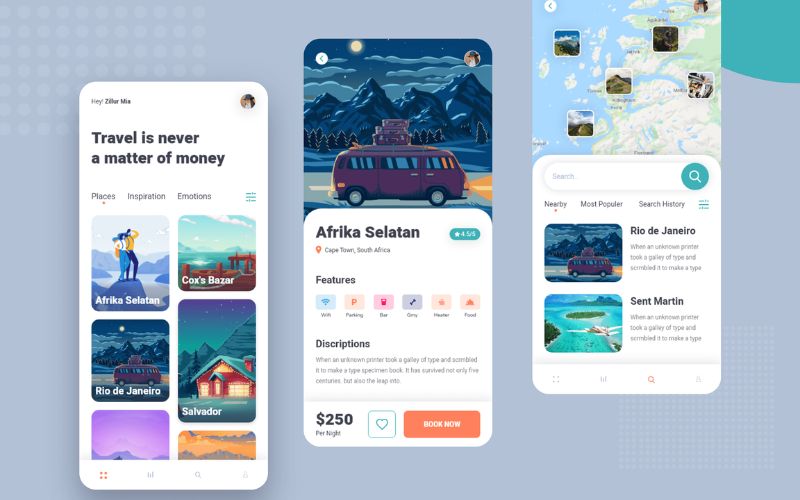
Enhance the
payment options available to users, such as net banking, e-wallets, debit cards,
credit cards, PayPal, WeChat Pay, Alipay Twint, Apple Pay, and Google Pay, so
that they are more easily able to pay from wherever they are.
It is also
necessary to ensure that payment systems are protected against the widespread
online fraud that occurs in the travel industry.
Communication with a Travel
Representative
There will
be some questions that users may have when reserving something online, but
neither you nor the hotel/tourism spot's website will be able to answer them
all.
Live chat
services will be appreciated by your customers, and they will experience
improved customer service. This will help you both convert potential customers
and retain them over time.
The most
important features that every app should possess are as follows. We have added
one additional feature to make our app stand out from the crowd.
Your Travel App Good-to-Haves
Here are the
good-to-have features with which you can boost your travel app away faster:
✈︎ Voice Search
✈︎ Weather
Forecasts
✈︎ In-App Language
Translators
✈︎ Personalized
Notifications & Offline Access
Conclusion
A good
travel application with which you can easily boost your online business must
include many features, which we mentioned in this article.
If you are
thinking about building a travel app to stand out among competitors, we help
you achieve this goal. Our team’s experts are specialists in web, desktop, iOS,
and android app development.
So just take
a minute and visit our website to see if there is anything we can help you and
your online business with.